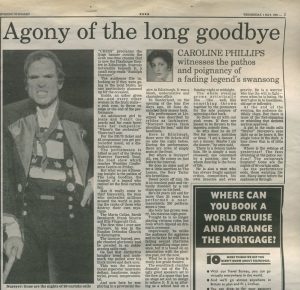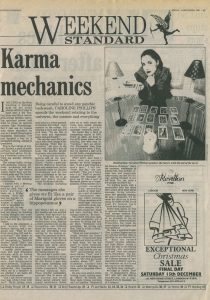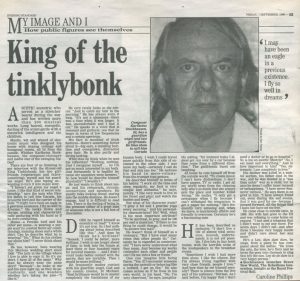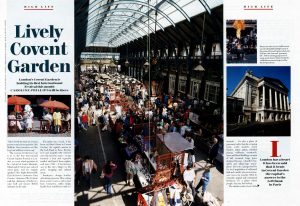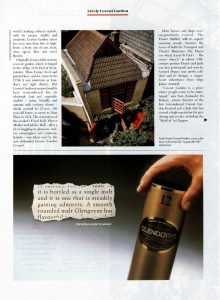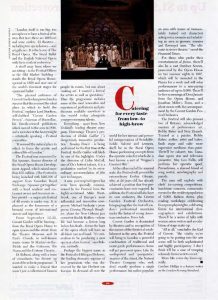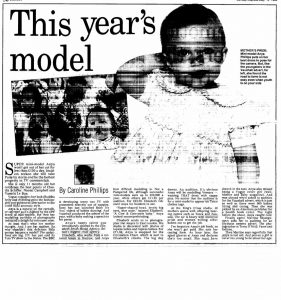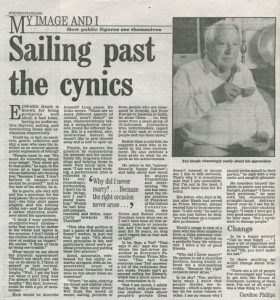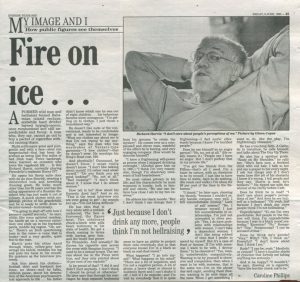Cool, self-assured, forthright former waitress, clerk and receptionist who was born in New Zealand. Devout, unimaginative housewife who was convicted in 1981 of murdering her nine-week-old baby Azaria by cutting her throat with a pair of nail scissors at Ayers Rock. Hard, unsympathetic, little bitty lady who was sentenced to life imprisonment with hard labour. Unflinching author of Through My Eyes, a direct and detailed account of her conviction and subsequent exoneration, phenomenally recalled in 768 pages. This is the image of the lady who went from housewife to household word. Enter Lindy Chamberlain, 42: Logical Lindy as she was known in prison, or Lindy Gulla (which means ‘good one’) to the Aboriginal girls. ‘It meant that I was all right and wasn’t going to put them down because of their colour or because they couldn’t read or talk properly.’
Cool, self-assured, forthright former waitress, clerk and receptionist who was born in New Zealand. Devout, unimaginative housewife who was convicted in 1981 of murdering her nine-week-old baby Azaria by cutting her throat with a pair of nail scissors at Ayers Rock. Hard, unsympathetic, little bitty lady who was sentenced to life imprisonment with hard labour. Unflinching author of Through My Eyes, a direct and detailed account of her conviction and subsequent exoneration, phenomenally recalled in 768 pages. This is the image of the lady who went from housewife to household word. Enter Lindy Chamberlain, 42: Logical Lindy as she was known in prison, or Lindy Gulla (which means ‘good one’) to the Aboriginal girls. ‘It meant that I was all right and wasn’t going to put them down because of their colour or because they couldn’t read or talk properly.’
Former prisoner 2958 looks like a smart secretary in her neat make-up, patent shoes, sheer tights, black skirt and striped shirt.
‘I’d wear shoestring straps, bare shoulders, very light clothes-Stubbies (shorts), thongs (flip-flops), boob tubes. I wore a sun frock for the first inquest.’ She speaks in a light and clipped antipodean accent, very Neighbours-ish, emphatic, high, but full of apparent self-assurance. She steamrollers interruptions-and my attempts to tell her she’s going off the point-pressing on determinedly with what she is saying, even when the questions are about something else, although the interview can only be short owing to her schedule.
She’s insistent on giving a history of her wardrobe, relating it mostly to her various court appearances. She is very much the one in control. Her look turns out, curiously, to have been moulded by the Press-after constant criticism, comments, admonishments ‘not to wear anything too busy or provocative’, photographers saying wear this or that. She’s very professional and has packaged herself nicely into a very saleable commodity.
‘I have a designer friend, Jean Bas, who dresses me for my interviews.’ She borrows the clothes and gives them back afterwards. ‘So it gives the impression you’re rich when you’re not.’
She charges for interviews, apart from when she’s launching a book. Exonerated but not compensated, she needs money. ‘All that publicity has meant I can’t get a job.’ It is the newspapers and television stations who have made money out of her plight.
She has been described as tough, unsympathetic and not showing enough emotion for a mother who had lost a child to a dingo.
‘I suppose my face in repose is fairly straight. It’s fairly severe when I’m not smiling. When you have 1500 cameras around you, jurors and hostile people looking at you, your face goes stiff. I tried to keep as neutral a face as possible. And then it looked severe.’ And now? ‘Well, yeah, this is it.’ (She’s smiling.) One of the things that went against her was her apparent passive acceptance of her loss. ‘An English response, misunderstood by the emotional Greeks and Italians in Australia . . . and when you believe in something after death, it doesn’t affect you so much. You don’t have a cold, hard feeling of nothing being left.’
People just saw a hard-nosed murdering bitch (her words) when they saw her. But she is a private person, guarded even, who doesn’t show her true feelings to strangers.
She has brown hair, brown eyes and has put on two stone while writing the book-which weighs almost as much. She laughs at the latter notion. She laughs easily and also has a sense of the ridiculous, which comes out in her book.
So how would she describe herself? ‘I’m normally about seven stone. I’m only five feet one inch and people think because I’m on TV that I’m taller. They always go, ‘Ooh, you’re tiny’.’
Does that make her strive more? ‘Oh no, I think nice things come in small parcels-otherwise, diamonds would come the size of Ayers Rock.’ She comes over as cool, very self-composed with a perkiness.
She has sad eyes that have seen a lot. Meryl Streep went further and said she had eyes like the survivor of a Nazi concentration camp. ‘I don’t know.’ (Laughs.) ‘I’ve never been in one of those.’
While she was in the prison next to an abattoir, kept awake at night by the sound of pigs being slaughtered, she worked on the drains and did cementing without gloves. How resilient! ‘With my bare hands. It’s really good hand cream.’
Suffering from flu, your interviewer repeats a question. ‘I told you that in my last answer,’ she says sharply. She knows how to keep a person on her toes. So how would she describe herself in terms of character? ‘Now in what way is that question different from the last one?’ she retorts in a chilly tone. What a hard time she gives! (Too intimidating to dare ask her about her sexuality. On simply enquiring about her relationship with her husband, one gets a frosty: ‘No comment.’) ‘Well, you have to be specific. I have a very accurate attention to detail. I’m fairly tidy, fastidious, too meticulous. I’ve always relied on memory-my book is from memory-and in court they’d say you can’t possibly have that good a memory.
‘I used to be shy in public, but not any more. That’s the greatest change . . . I don’t let people walk over me. If I get the wrong change in a shop, I say so instead of walking away disgruntled. I don’t suffer fools any more, though I’ll still be polite to stupid people.
‘I don’t think there’s any call to be rude to people. And I think you should remember to treat people the way you want to be treated.’ And what sort of mother is she? ‘A fairly reasonable one. I think I’m pretty laid back. If the kids fall over, I don’t scream and panic. But I do see if they are really hurt . . . I like to keep them fairly tidy and neat. My kids and I have a lot of fun . . .’
She continues: ‘I’ve always been a very positive person. I like to get all the information in before making a decision and then I’ll stick to it’-she’s rather boring in her delivery-‘I’ve got the reputation of being fairly stubborn. But if I hadn’t been, I would never have got out of jail. ‘I didn’t see why I should admit to something I hadn’t done just for an extra bit of physical comfort-I would have had to live with my conscience.’ Certainly, she has endurance and spirit.
‘If I make a promise I keep it. I’ll do anything humanly possible to do it.’ She’s leaning forward, fiddling with her leg, cradling herself in her arms; it’s the only time in the meeting that there’s any flexibility in her body, though she becomes progressively softer as the interview proceeds. ‘I guess that’s another reason I got labelled as being hard. I’d do things that went against the tide, even things that got me into trouble with the screws. But I believe in honesty.’
So what does she think got her through all this? ‘Faith,’ she says, her eyes lighting up. (She is a Seventh-day Adventist.) And how does the image of a formerly convicted murderess sit with her now? ‘Well, it never really worried me because I knew I was innocent.’ Does she think she’s a bitter person? ‘No.’
She’s been described as strange, difficult, sneering, callous, mysterious . . . ‘Well, am I?’ (Laughs.) ‘The papers got sick having to come up with something new over 10 years and just put down whatever came into their heads.’
She presents herself as amazingly self-possessed and calm. Image or reality? ‘I think that’s my nature. If there’s a road crash, I’ll pull over, act quite calmly-then feel sick afterwards.’
And is she formidable? ‘No.’ (Laughs.) A friend who hadn’t seen her for 12 years recently came over. ‘After 10 minutes, she said, ‘Gee, you haven’t changed at all’.’
I’ve got the reputation of being fairly stubborn. But if I hadn’t been, I would never have got out of jail.


